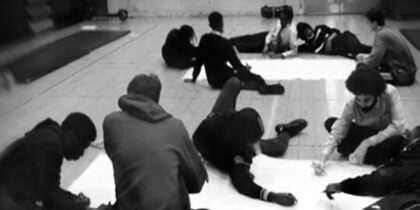An independent evaluation of Project Future
Jessica Stubbs, SC, D, M, T, R and Dr Graham Durcan
Research consistently shows that material, social and racial disadvantages increase risk of poorer wellbeing and offending among young people growing up in the most deprived areas. Yet many of those with mental health difficulties find that support is limited and hard to access.
The project was commissioned to address some of these inequalities as a community based wellbeing service for young people. The project works to improve young people’s wellbeing, access to services, and education, employment and training opportunities, with the long-term aim of reducing marginalisation and offending. It takes a radically different approach to service provision, drawing on the INTEGRATE model which puts mental health professionals into local communities to coproduce a service with young people which can meet local needs. Centre for Mental Health has been evaluating the project’s work over the past three years.
Unlocking a different future shares the untold story behind the young men often labelled as ‘gang members’: the context in which they have grown up, the inequalities they have faced and how these have prevented access to help and contributed to poor wellbeing and risk of offending.
My friend put something like ‘black man’ into Google and the first things to come up is crime stuff, robberies, burglaries. Nothing positive, like about black history. So that’s what society sees; where are the good stories about young black men?
You start to think this is who you are, this is the truth, you are no good and there’s nothing you can do about it, so you fall into their description…
Society sees you as a gang member. Everyone sees you like that. Like I was walking home and I had my hood up because it’s cold and you walk past a woman and she, like, clutches her bag tighter. Like I’m not gonna do anything, but that’s the way society looks at you.
The evaluation highlights that young people involved in the project saw a significant improvement in their wellbeing during their contact with the project. Many got help from the project with health, employment, training, welfare and justice. In addition, 18 young people were employed by the project as community consultants, responsible for co-creating the project.
We’re calling for:
- Local authorities, NHS commissioners, Police and others should pool budgets to offer long-term funding to services like the project which support marginalised young people.
- Mental health service providers and commissioners should develop services for young people using the principles of the project: at least one in every Sustainability and Transformation Partnership or Accountable Care System area.
- Schools need to be ‘psychologically informed’, with staff who are trained in understanding and addressing trauma, stress and distress and ‘life lessons’ on the curriculum.
- Prisons need a profound culture shift to prioritise wellbeing and rehabilitation in order to stop the cycle of offending.







